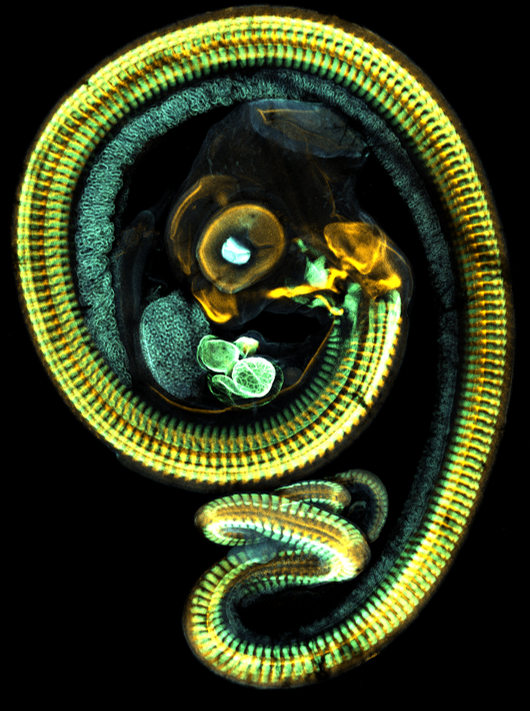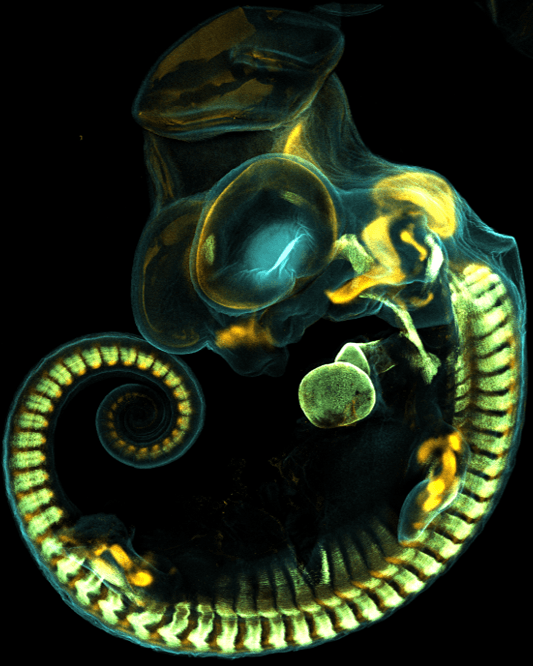Fabbri Lab

Life as we know it today is the latest chapter of a story that is hundreds of millions of years in the making, and it is the result of biological drivers and environmental perturbation through deep time. Because of this, my research uses both the fossil record and neontological data to disentangle the evolutionary patterns that led to our modern world, with the general scope of answering the question: how did we come to be? Therefore, my research is at the interface of the geological record of life and the biological mechanisms driving its evolution and focuses on the tempo and mode of major evolutionary transitions of extinct and extant clades.
My research includes 1) specimen-based research to track morphological, ecological, and functional transformation through time, 2) quantitative comparative methods to infer the link between geological and biological events that shaped morphology and its relationship to ecology, function, and behavior; 3) Evolutionary-Developmental Biology to infer the mechanisms behind the appearance of key evolutionary features using embryos of modern taxa within a phylogenetic framework and model evolutionary hypotheses applying a synthetic view obtained through the integration of data from embryogenesis and fossils. Indeed, while the fossil record is vital to conceptualize phenotypic transformations and the series of events that favored the origin and divergence of modern diversity, including extrinsic factors, the geological timespans over which the series of events giving birth and rise to major clades are recorded is simply too broad to approach questions at the mechanistic level, which is necessary to understand processes affecting anatomical transformations. In order to clarify how certain traits evolved, I study the plasticity of embryos and the developmental pathways characterizing them.
Education
- Postdoctoral, Department of Organismal Biology & Evolution, University of Chicago
- Postdoctoral, Field Museum of Natural History
- PhD, Department of Earth & Planetary Sciences, Yale University
- MSc, School of Earth Sciences, University of Bristol
- B.S., Department of Geosciences, Universita di Firenze
Research Projects
Systematics and evolution
Major ecological transitions: water-to-land, land-to-water
How developmental pathways inform on evolutionary transitions
Relationship between genotype and phenotype
Selected Publications
Fabbri M, Mondiardino N, Pritchard A, Hanson M, Hoffman E, Bever GS, Balanoff A, Morris ZS, Field D, Comacho J, Rowe T, Norell MA, Smith R, Abhzanov A, Bhullar BAS. The skull roof tracks the brain during the evolution and development of reptiles including birds. Nature Ecology & Evolution 2017; 1:1543
Norell MA, Wiemann J, Fabbri M, Yu C, Marsicano CA, Varricchio D, Pol D, Zelenitsky D. The first dinosaur egg was soft. Nature 2020; 583:406-410
Fabbri M, Navalon G, Benson RJB, Pol D, O’Connor J, Bhullar BAS, Erickson GM, Norell MA, Orkney A, Lamanna MC, Zouhri S, Becker J, Emke A, Dal Sasso C, Bindellini G, Maganuco S, Auditore M, Ibrahim I. (2022) Subaqueous foraging among carnivorous dinosaurs. Nature 2022; 603:852-857
Dutel H, Fabbri M. Fish fossil unfolds clues to vertebrate brain evolution. Nature 2023; 614:422-423
People
Courses Taught
ME: 130.600
SFM Human Gross Anatomy
This seven-week Human Anatomy course is taught to first year medical students in the Johns Hopkins University School of Medicine. Designed to provide a comprehensive regional approach to the human body, this course includes lecture, cadaver dissection with emphasis on the three-dimensional relationships of anatomic structures, clinical correlations, medical imaging sessions, and team-based learning small group activities.
News
Do you think he saur-us? Dinos and sensory ability
We are thrilled to announce that Dr. Amy Balanoff has recently recorded an insightful podcast episode with NPR Think and co-authored an article for Scientific American! Congratulations on these fascinating contributions. Your commitment to advancing knowledge and...
Welcome!
It is our distinct pleasure to announce that Dr. Amy L. Balanoff will be joining the FAE faculty on July 1. Amy is currently the Co-Director of Undergraduate Studies, David S. Olton Behavioral Biology Program, and Assistant Research Professor in...



